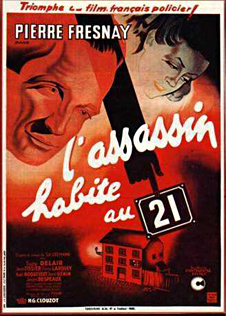THE MURDERER LIVES AT NUMBER 21 /
L’Assassin habite au 21
International Premiere (restored version) • Film Noir • France, 1942
DCP • 1.37 • Mono • B&W • 84 min
Directed by: Henri-Georges Clouzot
Written by: Henri-Georges Clouzot, Stanislas-André Steeman, after the novel by Stanislas-André Steeman
Cinematography: Armand Thirard
Film Editing: Christian Gaudin
Original Score: Maurice Yvain
Produced by: Alfred Greven
Cast: Pierre Fresnay (Inspector Wenceslas Wens), Suzy Delair (Mila Malou), Jean Tissier (Triquet), Pierre Larquey (Monsieur Colin), Noël Roquevert (Docteur Théodore Linz).
International Sales: Gaumont
US Distributor: Janus Films
Inspector Wens is hunting down a serial killer calling himself Mr. Durand. The trail leads him to 2l, rue Junot, the address of a shabby boarding house that an assortment of misfits and oddballs call home. The trail also leads him to Mila, an aspiring starlet who hopes that the publicity she gets by cracking the case will give her acting career a jumpstart. Working undercover, they try to root out the killer, but their initial suspicions soon give way to wilder speculations. Part Agatha Christie mystery, part screwball comedy, this wartime classic also has an enjoyably sinister undercurrent that captures the pervasive paranoia and dread that was in the air during the German Occupation. Here is your chance to see the first bow from the French grandmaster of suspense, restored to its full original glory.
Americans are most familiar with writer/director Henri-Georges Clouzot for the thriller Diabolique (1955), a deliciously devious precursor to the psycho-thriller and slasher sub-genres. Clouzot initially aimed for a career in diplomacy, but a bout of tuberculosis kept him bedridden for five years, and he spent the time reading and honing the storytelling skills that would eventually lead to a flourishing screenwriting career. His health problems kept him at home during the war, where he continued to make films during the Occupation. This led to accusations of collusion and his notorious lifetime ban from filmmaking when Le Corbeau: The Raven (1943), which he directed and co-wrote, was labeled as anti-French propaganda. His exile was lifted in 1947 and his reputation was restored with the stylish dark thriller Quai des Orfèvres, his third adaptation from the well-known crime writer Stanislas-André Steeman. An exacting perfectionist, Clouzot went on to make only eleven feature films, but they were enough to secure his front row seat in the pantheon of thriller and suspense film.
“This markedly assured debut … shot through with a delightfully noirish streak and an abundance of misanthropic undertones.”
- Ben Nicholson cinevue
“The great director's technique is surprisingly mature and effective in this early film, the film's opening five minutes or so being particularly gripping and shocking.”
- James Travers FILMSDEFRANCE







